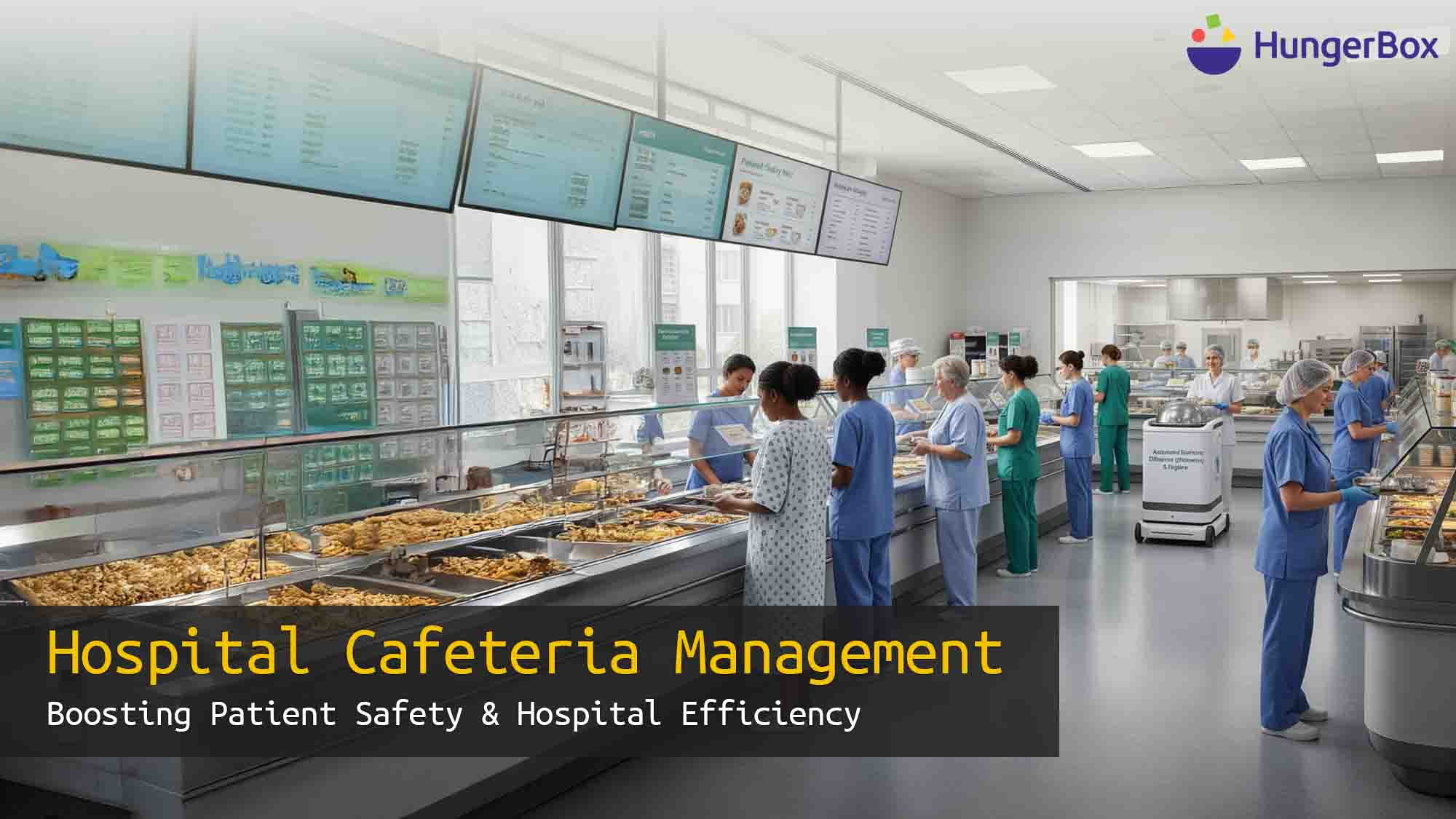
Hospital Cafeteria Management: Boosting Patient Safety & Hospital Efficiency
In modern healthcare, food goes beyond nutrition and taste. It is a critical extension of patient care and hospital operations. Effective healthcare cafeteria management ensures that patients, staff, and visitors receive safe, nutritious food in a timely manner while also supporting overall hospital efficiency. From reducing healthcare risks to following compliance and streamlining costs, cafeteria management has become a strategic priority for healthcare facilities.
Food Safety The Hidden Key to Patient Well- Being
Hospitals cater to a vulnerable population, including patients with compromised immunity, chronic illnesses, and dietary restrictions. Any lapse in cafeteria operations can have direct consequences on patient safety. Key aspects include:
- Strict Hygiene Standards: Healthcare cafeterias must adhere to stringent food handling, storage, and preparation protocols to avoid contamination.
- Allergen Transparency: Clearly labelled menus with allergen and ingredient information reduce risks for patients with dietary sensitivities.
- Specialized Diets: Patients often require condition-specific diets, such as low-sodium meals, diabetic-friendly options, or soft diets for post-surgical recovery. Efficient cafeteria management ensures accuracy in meal preparation and delivery.
By integrating digital cafeteria systems, hospitals can automate menu tagging, track ingredient sourcing, and ensure consistency in food safety protocols.
Enhancing Hospital Efficiency through Digital Cafeteria Solutions
Efficient food operations directly impact hospital performance. Manual cafeteria systems often struggle with delays, wastage, and billing errors. With smart healthcare cafeteria management software, hospitals gain:
- Real-Time Meal Forecasting: Syncing with patient admission data and staff schedules to accurately predict meal demand.
- Reduced Food Waste: Optimized procurement and inventory tracking help avoid overproduction and unnecessary costs.
- Prompt Service: Mobile pre-ordering, automated billing, and smart queue systems minimize wait times for staff and visitors.
- Cost Transparency: Digital dashboards provide insights into cost-per-meal analytics, allowing administrators to track efficiency across departments.
Hospitals with digital cafeteria solutions report reduced downtime, leaner food operations, and better compliance with food safety audits.
Explore how HungerBox is transforming dining experiences for medical institutions on our Healthcare cafeteria management.
Supporting Staff Well-Being
Doctors, nurses, and hospital staff work long, high-pressure shifts. The cafeteria plays a vital role in supporting their wellness. With healthcare cafeteria management systems:
- Staff can pre-order meals during breaks, avoiding long queues.
- Nutritious menu options aligned with wellness programs can boost energy and morale.
- Cashless payments and app-based ordering reduce unnecessary friction during mealtimes.
A well-managed cafeteria contributes to staff satisfaction, which directly impacts patient-care quality.
Compliance and Accreditation Standards
Hospitals are governed by strict regulations around food safety and hygiene. Compliance with local health boards, OSHA, and accreditation bodies (like NABH or JCI) often depends on robust cafeteria management. Digital systems help hospitals:
- Maintain audit-ready reports on hygiene checks, sanitation cycles, and vendor compliance.
- Implement contactless ordering and billing to reduce infection risks.
- Track vendor hygiene certifications and service-level agreements (SLAs) digitally.
This not only ensures regulatory compliance but also builds trust with patients and caregivers.
Cafeteria Management and Patient Experience
Beyond medical treatment, food is a key part of the patient journey. Personalized, safe, and timely meals improve recovery outcomes and overall satisfaction. Hospitals can leverage cafeteria platforms to:
- Enable meal feedback systems so patients can rate and review meals in real-time.
- Personalize menus as per patient profiles.
- Provide families and visitors with convenient dining options within the hospital campus.
The Tech Revolution in Healthcare Cafeteria Management
Leading hospitals are adopting cafeteria software solutions to streamline operations. Key features include:
- QR-based ordering systems to minimize touchpoints.
- Mobile apps for menu browsing, ordering, and payments.
- Automated inventory management to track stock and reduce wastage.
- AI-driven demand forecasting to align meal prep with occupancy levels.
These solutions turn cafeterias into intelligent, data-driven ecosystems that improve efficiency and safety simultaneously.
Sustainability and ESG in Healthcare Dining
Hospitals also face pressure to align with sustainability and ESG goals. Smart cafeteria management helps reduce food waste, optimize energy consumption, and support eco-friendly packaging. By digitizing cafeteria operations, healthcare institutions can:
- Generate sustainability reports for audits.
- Track food wastage.
- Partner with vendors offering eco-conscious practices.
This strengthens hospital reputation while meeting green compliance targets.
Transforming Hospital Dining for Better Care
Healthcare cafeteria management is no longer a back-office function. It is integral to patient safety, hospital efficiency, and staff well-being. By embracing digital cafeteria solutions, hospitals can minimize risks, improve compliance, support staff morale, and enhance patient satisfaction.
In a sector where safety and efficiency are paramount, the cafeteria must evolve into a smart and patient-centric ecosystem. If you’d like to explore how we can help your hospital achieve this, contact us today to learn more. Or, if you’d prefer a hands-on experience, schedule a free demo and see how our solutions can transform healthcare dining in real time.